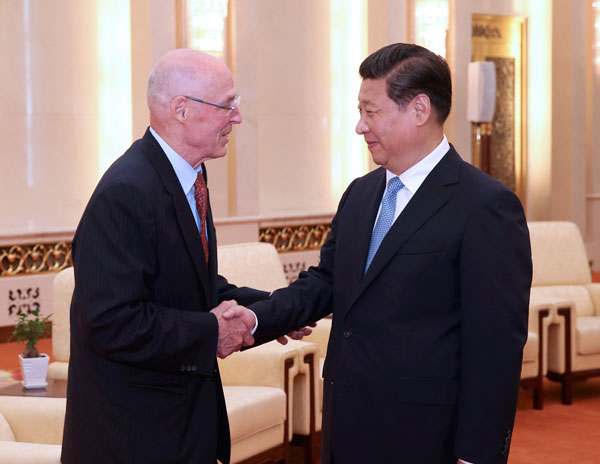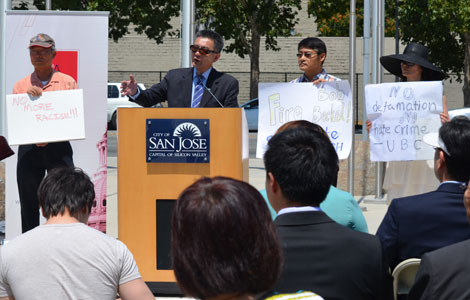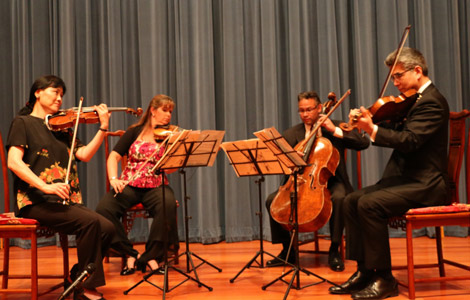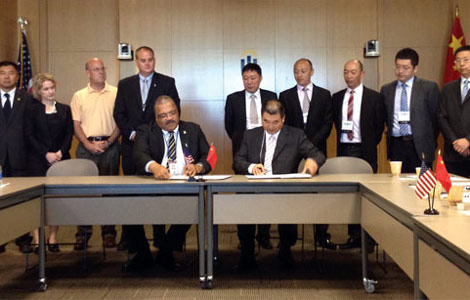Xi urges US to view China 'objectively'
Updated: 2014-07-03 07:13
By LI XIAOKUN and ZHANG YUNBI in Beijing and CHEN WEIHUA in Washington (China Daily USA)
|
||||||||
 |
|
Chinese President Xi Jinping (R) meets with former US treasury secretary Henry Paulson in Beijing on Wednesday. [Photo/Xinhua] |
The United States should objectively view China's national conditions and policies, President Xi Jinping told a former senior US official on Wednesday, ahead of a key bilateral dialogue between the world's two largest economies.
Xi made the remarks in a meeting with a group of US business leaders led by former US Treasury Secretary Henry Paulson, who is in Beijing to push forward a Bilateral Investment Treaty (BIT). Analysts described Xi's words as reflecting Beijing's sincere desire to narrow the gap in thought and strive for substantial progress in the sixth meeting of the China-US Strategic and Economic Dialogue (S&ED) to be held July 9-10 in Beijing.
"The two sides should expand common interests, deepen cooperation, plant more flowers, not thorns, clear the interference and avoid suspicion and confrontation," Xi said.
The Chinese president pledged that his country would stick to the path of peaceful development and shoulder its international duties.
"We hope the US will objectively view China's basic national conditions as well as its domestic and foreign policies," Xi said.
Xi also encouraged both sides to "make full use" of bilateral mechanisms such as the S&ED to keep "injecting positive energy" into the key ties and bring tangible achievements.
Xi's comments pointed out the major stumbling blocks and troubles that haunt the China-US relationship, said Dong Manyuan, vice-president of the China Institute of International Studies.
"Bilateral trade surpassed $500 billion last year, which signifies a brighter future," Dong said.
"Therefore, the action of cultivating thorns instead of flowers is totally unnecessary."
The complex bilateral relationship between Beijing and Washington has recently been soured by what Beijing sees as Washington's irresponsible and biased comments on issues such as maritime territorial disputes and alleged cyber theft.
US Treasury Secretary Jack Lew on Tuesday called on China to further appreciate its currency, open its financial services sector and speed up economic reforms, issues expected to be raised at the S&ED.
Adam Posen, president of the Peterson Institute for International Economics in Washington, said on Wednesday that the facts regarding the Chinese exchange rate are not as negative as Lew described.
"I would be sympathetic to Secretary Lew and the US government in raising this issue if the Chinese intervention continues in a sustained way for a much longer period, and the trade deficits (with the US) were to expand largely," he said.
"But at the moment, I'm not sure we should be quite as critical on this as we've been in the past," said Posen, who just returned with a group of Peterson Institute economists from an economic forum in China.
Lew and Secretary of State John Kerry are preparing to travel to Beijing for the S&ED. State Councilor Yang Jiechi and Vice-Premier Wang Yang will lead the Chinese delegation to the meeting.
Paulson, who is on his 80th visit to China, told Xi that the US business community is expecting the signing of a BIT soon. Discussion of the treaty will be a high priority at the talks.
Paulson headed the US delegation in the S&ED as treasury secretary from 2006 to 2009.
US Ambassador Max Baucus said last week that a bilateral investment treaty could benefit China as much as Beijing's accession to the World Trade Organization did in 2001.
Lew described Chinese commitment on BIT talks as a major breakthrough in last year's S&ED, but he said on Tuesday that it was unrealistic to expect the sides to conclude the BIT in a couple of weeks.
Nick Lardy, a senior fellow at the Peterson Institute, agreed, saying he is not expecting to see any significant progress on the BIT for the simple reason that S&ED is not a negotiation and getting-down-to-details meeting.
"I am sure there will be some supporting language, expressions of hope that China will participate more fully in these discussions, and an agreement will be reached," he said.
The US side hopes the BIT will help open China's vast financial service sector to US businesses, while China has for years urged that its growing foreign direct investment in the US be better protected and not politicized and that the US would lift more bans on high-tech exports to China.
Lew said on Tuesday that the US welcomes Chinese investment in the US. He said the number of Chinese FDIs that cause national security concerns is very small.
Lardy said he was surprised that these are still on China's ask list, but he believes it's politically not feasible for the Obama administration to go to Congress to ask for a change in relevant laws. The relationship between the administration and lawmakers is at its worst in many years.
"We're expecting the Chinese to do things on their end, but we're very constrained on our end," he said.
Contact the writers at lixiaokun@chinadaily.com.cn,zhangyunbi@chinadaily.com.cn and chenweihua@chinadailyusa.com.

 Silicon Valley rally calls on Fox News to fire Beckel
Silicon Valley rally calls on Fox News to fire Beckel
 Look who's two, Xiao Liwu!
Look who's two, Xiao Liwu!
 Philadelphia Orchestra meets the press
Philadelphia Orchestra meets the press
 Chinese, US naval hospital ships conduct exchange
Chinese, US naval hospital ships conduct exchange
 High rent pressures NYC Asian eateries
High rent pressures NYC Asian eateries
 Artists advocate for environmental protection
Artists advocate for environmental protection
 Wichita, Kansas to Xi'an, China: Come fly with us
Wichita, Kansas to Xi'an, China: Come fly with us
 Amateur team aims for great heights
Amateur team aims for great heights
Most Viewed
Editor's Picks

|

|

|

|

|

|
Today's Top News
Ex-security chief Zhou Yongkang under probe
Microsoft probed for monopoly
4 charged for murdering student
Prudence urged over solar dispute
Baidu developing 'self-driving' car
US visa delays likely to continue
McDonald's fishing for supplier
OSI group to fund food safety
US Weekly

|

|






